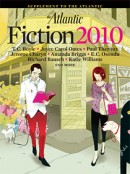 The Atlantic has made its 2010 Fiction issue available online. It includes several short stories and three other features: an interview with Paul Theroux titled “Fiction in the Age of E-Books,” an essay by Joyce Carol Oates on returning to teaching after the death of her husband, and Richard Bausch on the massive industry of “how to” writing books:
The Atlantic has made its 2010 Fiction issue available online. It includes several short stories and three other features: an interview with Paul Theroux titled “Fiction in the Age of E-Books,” an essay by Joyce Carol Oates on returning to teaching after the death of her husband, and Richard Bausch on the massive industry of “how to” writing books:
My quarrel is with the implication in the how-to books market that one can merely read them to find the magic secret for writing well enough to publish. Recently, at a college where I was lecturing, a student told me, with great pride, that he had “over a hundred books” in his library—I could see that I was meant to be impressed by the number, and that he considered himself a vastly well-read type of guy. He went on to say that many in his collection are how-to books. This person wants to be a writer, but he doesn’t want to do the work. Being a writer is a stance he wants to take. He did not come to writing from reading books, good or bad. He came to it from deciding it might be cool to walk around in that role. I meet this kind of “writer” far too often now in my travels around the country—even, occasionally, in the writing programs.
I can hear the argument coming back: “Yeah, well, what about the writing programs? Don’t they promise the same thing? Don’t they encourage the same kind of thinking?” And the answer to that is quite simple: no, they do not. All of the writing programs, and most of the writers’ conferences—I have taught at Bread Loaf and Sewanee, and elsewhere—read manuscripts in advance before accepting students. A person has to demonstrate talent to be accepted into a program of study. And while at times one wonders how this or that student got by the screening, in all instances the emphasis is on reading, and the workshops are not about writing as something like steam-fitting or the construction of an engine, but about the matters of craft that can be discussed as they come up, story by story.

